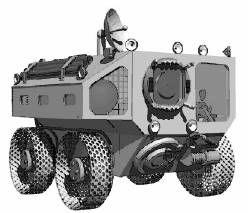
Home - Search - Browse - Alphabetic Index: 0- 1- 2- 3- 4- 5- 6- 7- 8- 9
A- B- C- D- E- F- G- H- I- J- K- L- M- N- O- P- Q- R- S- T- U- V- W- X- Y- Z
Lunar Polar Rover
 Lunar Polar Rover |
Status: Study 1999. Gross mass: 6,080 kg (13,400 lb).
In 1999 Arno developed a structured process for designing planetary surface vehicles. This design process used a systematic approach that began by assessing requirements and needs, mission constraints, mass limits, power allowances, etc. Using this process Arno developed a pressurized rover concept for a hypothetical lunar polar mission. The rover was specifically designed to carry up to 500 kg of plowing, digging, and drilling equipment. It was also designed with manipulator arms that could lift up to 50 kg. The 6,080 kg rover consisted of a 6 mm thick aluminum pressure shell with stiffener construction for rugged duty. One airlock provided compatibility with base habitat modules. The power system consisted of fuel cells providing a nominal 2.5 kW continuous and 6 kW peak electrical power. Four wheels ,1.5 m diameter and 0.5 m wide, provided all wheel drive with motors, speed reducing transmission, and steering mechanism in each wheel. The design included power and weight requirements of various drilling, digging, and hoisting equipment. A crew of three could be accommodated for a six day sortie, at a maximum range of 100 km. Assuming only 1 hr per day of traveling, the rover's maximum speed was 20 km/hr, in good road conditions. The polar rover was able to cross crevices up to 1 m wide, and traverse solid soil grades of 30 percent, and 20 percent for loose soil terrain.
Crew Size: 3. Electric System: 6.00 average kW.
Family: Lunar Rovers, Moon. Country: USA. Agency: NASA, Arno. Bibliography: 1995.
Back to top of page
Home - Search - Browse - Alphabetic Index: 0- 1- 2- 3- 4- 5- 6- 7- 8- 9
A- B- C- D- E- F- G- H- I- J- K- L- M- N- O- P- Q- R- S- T- U- V- W- X- Y- Z
© 1997-2019 Mark Wade - Contact
© / Conditions for Use